Disarmament Toolkit 2024
UNRCPD and the Prajnya Trust conclude the 2024 edition of the Disarmament Toolkit online course
The third edition of the Disarmament Toolkit, jointly organized by the United Nations Regional Centre for Peace and Disarmament in Asia and the Pacific (UNRCPD) and the India-based Non-Governmental Organization (NGO) Prajnya Trust, held online on 26-28 June and 3-5 July, for a total of six sessions.
The Disarmament Toolkit 2024 recorded 628 registered participants from 80 countries and brought together participants from various backgrounds, including university students, professors, representatives from international and regional organizations, civil society organizations, and practitioners. This year, we reached the objective of increasing access to information on disarmament, arms control, and non-proliferation by the general public while fostering a gender-inclusive approach throughout. In particular, “Regional Spotlight” was added as an entirely new section to the course, allowing participants to learn about disarmament topics while gaining insights into regional dynamics.
Day 1: Disarmament Agendas
Anchored by Dr. Swarna Rajagopalan, Founder and Managing Trustee of Prajnya Trust, the first day’s session served to introduce key disarmament agendas and prepare participants for the following disarmament discussions. Mr. Deepayan Basu Ray, Director of UNRCPD, delivered the opening remarks with expectations for the participants.
As the first speaker of the day, Mr. Boyi Zhang, Junior Project Advisor for Youth and Disarmament at UNRCPD, introduced the Secretary General’s Disarmament Agenda and Our Common Agenda, and provided participants with an introduction to the broad disarmament framework, and the work of the United Nations in promoting sustainable peace through disarmament, non-proliferation and arms control.
Shifting the focus to gender, peace, and security, Dr. Swarna Rajagopalan addressed the crucial role of gender equality in peacebuilding and disarmament efforts, with a focus on the Women, Peace and Security (WPS) Agenda. Highlighting the importance of gender inclusion, she emphasized how incorporating diverse perspectives strengthens disarmament endeavors.
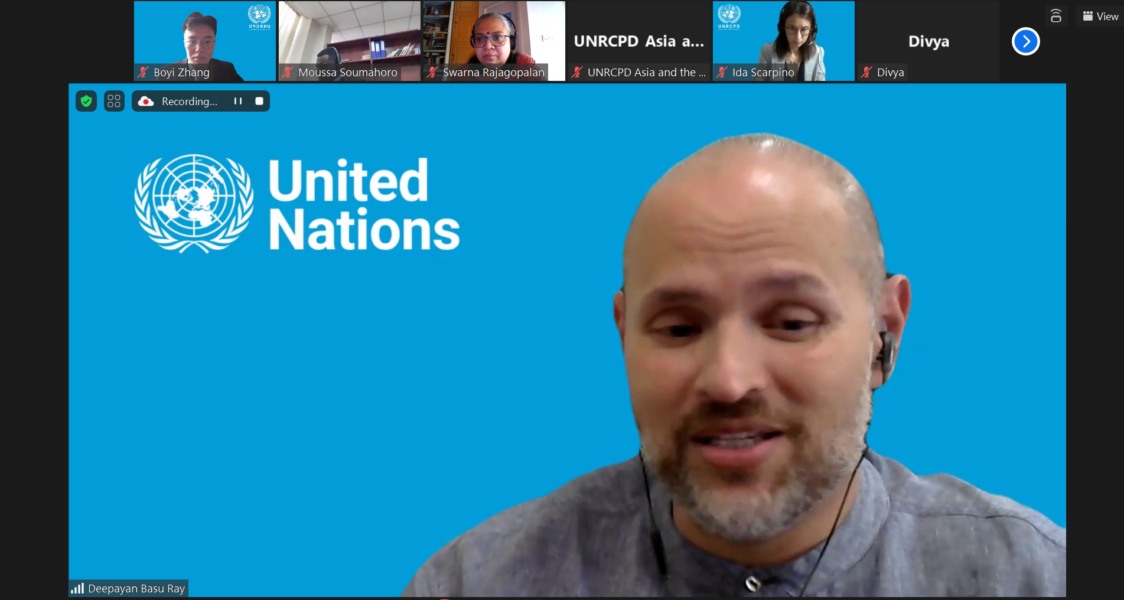
Regional Spotlight: Africa
The first regional session of the Disarmament Toolkit 2024 focused on Africa. Mr. Moussa Soumahoro, a researcher at the Africa Peace and Security Governance Programme, presented the disarmament challenges in the region. His insights shed light on the unique obstacles and potential solutions for disarmament on the African continent.

Day 2: Weapons of Mass Destruction (WMD)
The day’s moderator, Mr. Aaron Junhoung Yoo, Deputy Director of UNRCPD, began the session by introducing the key issues on weapons of mass destruction, specifically nuclear, radiological, biological and chemical weapons. The first speaker,Ms. Fiona Simpson, Deputy Chief of the WMD Branch and Senior Political Affairs Officer of the UN Office for Disarmament Affairs (UNODA), kicked off the day with a detailed presentation on multilateral approaches to nuclear disarmament. She explained the existing nuclear disarmament and non-proliferation regime, which includes multilateral treaties, regional instruments, bilateral agreements, and additional State-led initiatives.
The second speaker of the day,Mr. Keegan McGrath, Senior Policy Officer in the Office of Strategy and Policy, Organization for the Prohibition of Chemical Weapons (OPCW) followed with a presentation on chemical weapons, provided definitions of chemical weapons and informed the audience about the work of the OPCW in monitoring and advising on the implementation of the Chemical Weapons Convention (CWC).
Mr. Suryesh Namdeo, Senior Research Analyst at the Indian Institute of Science, also explained the definition of biological weapons and explored the historical background of their development. He also highlighted the challenges for national biosecurity, including the possibility of bioterrorism, the lack of a robust policy and institutional framework, and insufficient awareness among scientists, policymakers, and industry. He emphasized the importance of fostering connections between science and policymaking.
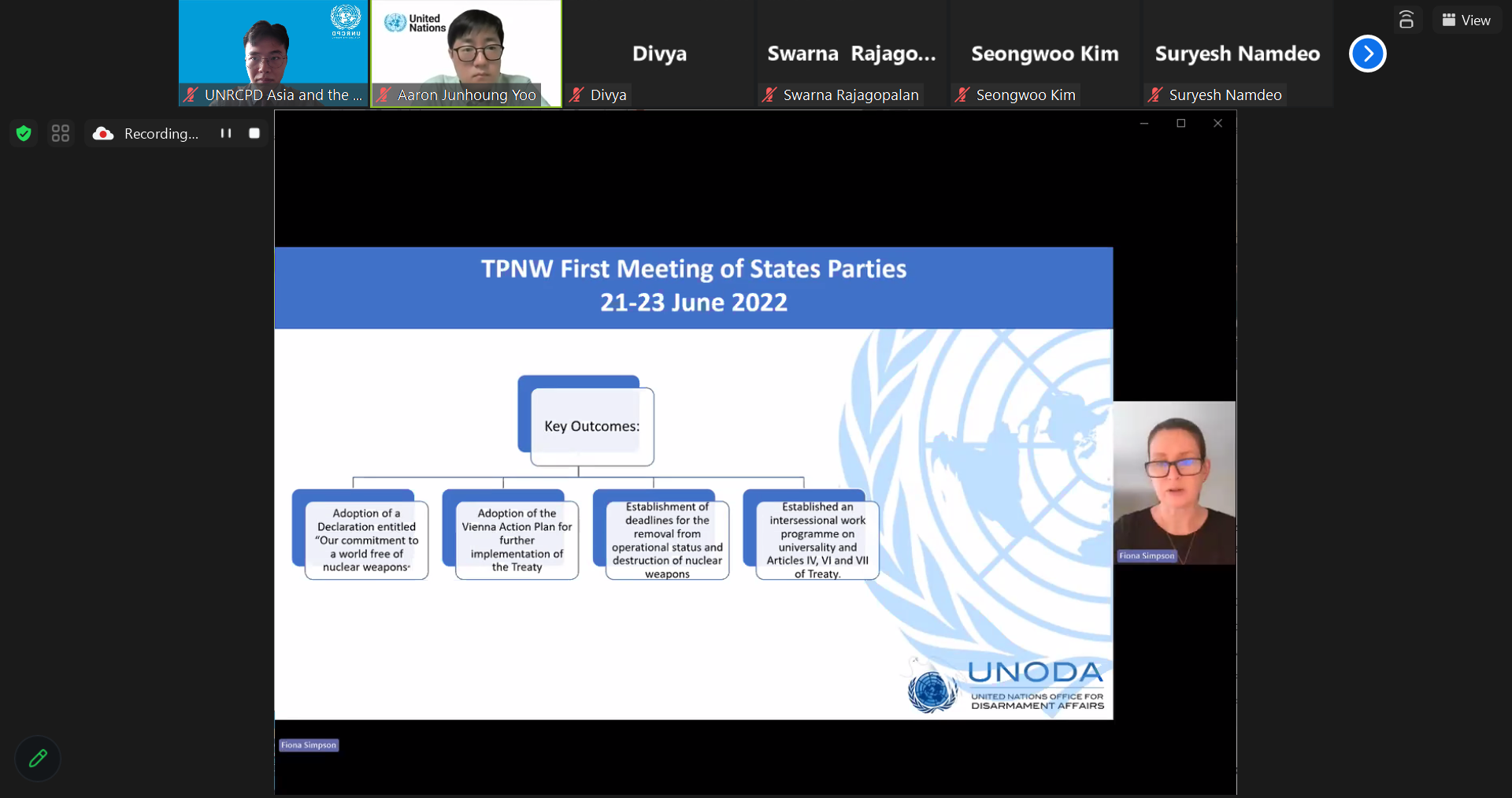
Regional Spotlight: Northeast Asia
The day concluded with a regional spotlight on Northeast Asia, presented by Ms. Soyoung Kim, Researcher at the S. Rajaratnam School of International Studies, Nanyang Technological University in Singapore. She shared her insights on the issues in the region, emphasizing the potential role of regional stability and a balance of power in achieving disarmament.

Day 3: Emerging Technologies, Outer Space, and Cyber Security
Day 3 was commenced by Mr. Boyi Zhang, moderator of the day, by first taking the participants on an imaginative journey into the future. With visions and questions from the participants, Mr. Deepayan Basu Ray highlighted the dual-use nature of emerging technologies and emphasized that while science and technology can be a force for good, they can also be a new frontier in weaponry and military technology. His presentation addressed the use of Artificial Intelligence (AI) on the battlefield encompassing AI’s potential applications in military logistics, training exercises, and even its convergence with other developing technologies.
After that, Mr. Michael Spies, Deputy Chief of the Geneva Branch at UNODA, provided a policy primer on outer space. He discussed the challenges arising from the increasing competition in space, including the rapid rise in space launches. He highlighted potential threats to existing space systems and introduced Article IV of the 1967 Outer Space Treaty. The next presentation is delivered by Ms. Katherine Prizeman, Political Affairs Officer at UNODA, focused on multilateral diplomacy in Information and Communication Technologies (ICT) and cybersecurity under the auspices of the United Nations. She explained the terminology and discourse in the UN regarding these issues.
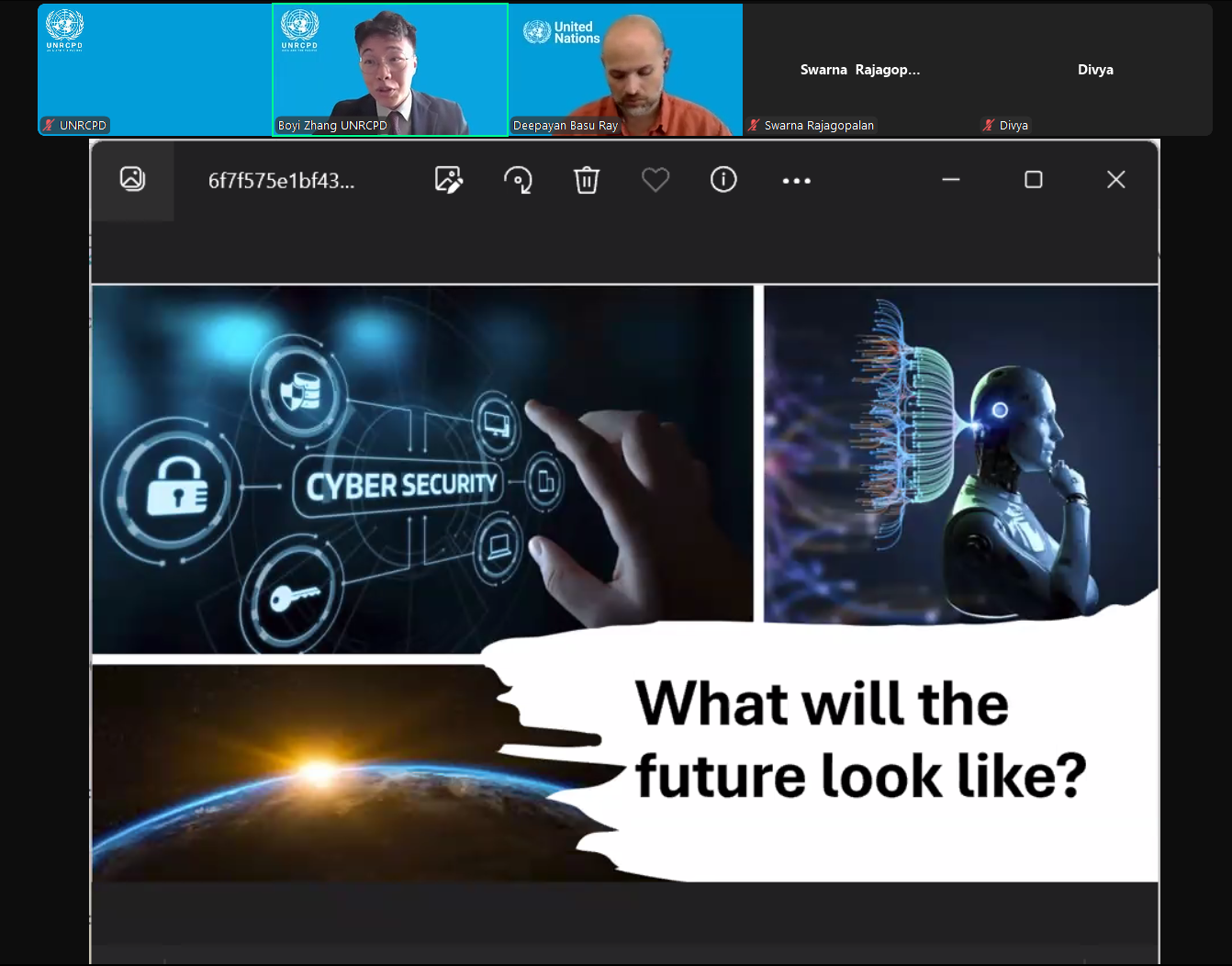
Regional Spotlight: South Asia
Focusing on South Asia, Dr. Kanti Bajpai, Vice Dean and Professor of Asian Studies at the Lee Kuan Yew School of Public Policy, National University of Singapore, highlighted nuclear weapons as the most pressing disarmament challenge in the region. He expressed particular concern about the escalating trilateral conflict involving India, Pakistan, and China. The ongoing tensions pose a significant threat to regional and global stability.

Dr. Kanti Bajpai, Vice Dean and Professor of Asian Studies at the Lee Kuan Yew School of Public Policy, National University of Singapore, emphasizing the ongoing tensions in the region
Day 4: Conventional Weapons
The Anchor of day 4, Ms. Ida Scarpino, Political Affairs Officer of UNRCPD, delivered an introduction on the key notions and global instruments in conventional weapons portfolio.
Mr. Max Menn, Crime Prevention and Criminal Justice Officer, United Nations Office on Drugs and Crime (UNODC), explained how global instruments work together to counter arms trafficking and its connections to terrorism. He introduced the concept of the “Arm-Crime-Conflict Nexus,” highlighting the interconnectedness of these issues.
Secondly, Ms. Juliana Helou van der Berg, Political Affairs Officer in the Geneva Branch of UNODA, introduced the Convention on Certain Conventional Weapons, focusing on the issue of Lethal Autonomous Weapon Systems (LAWS) as well as other ramped up challenges, risks, and concerns related to autonomous weapons.
Ms. Cristy McLennan, Country Director of Sri Lanka, Mines Advisory Group (MAG), focused on landmines and the 1997 Mine Ban Treaty. She explained the five pillars of mine action and international mine action standards, using Sri Lanka as a case study. Ms. Matilde Vecchioni, Associate Researcher at the Conventional Arms and Ammunition Programme, United Nations Institute for Disarmament Research (UNIDIR), presented craft-produced weapons from a global perspective. She identified the various actors involved in craft-produced weapons, ranging from hunters and collectors to criminal organizations.
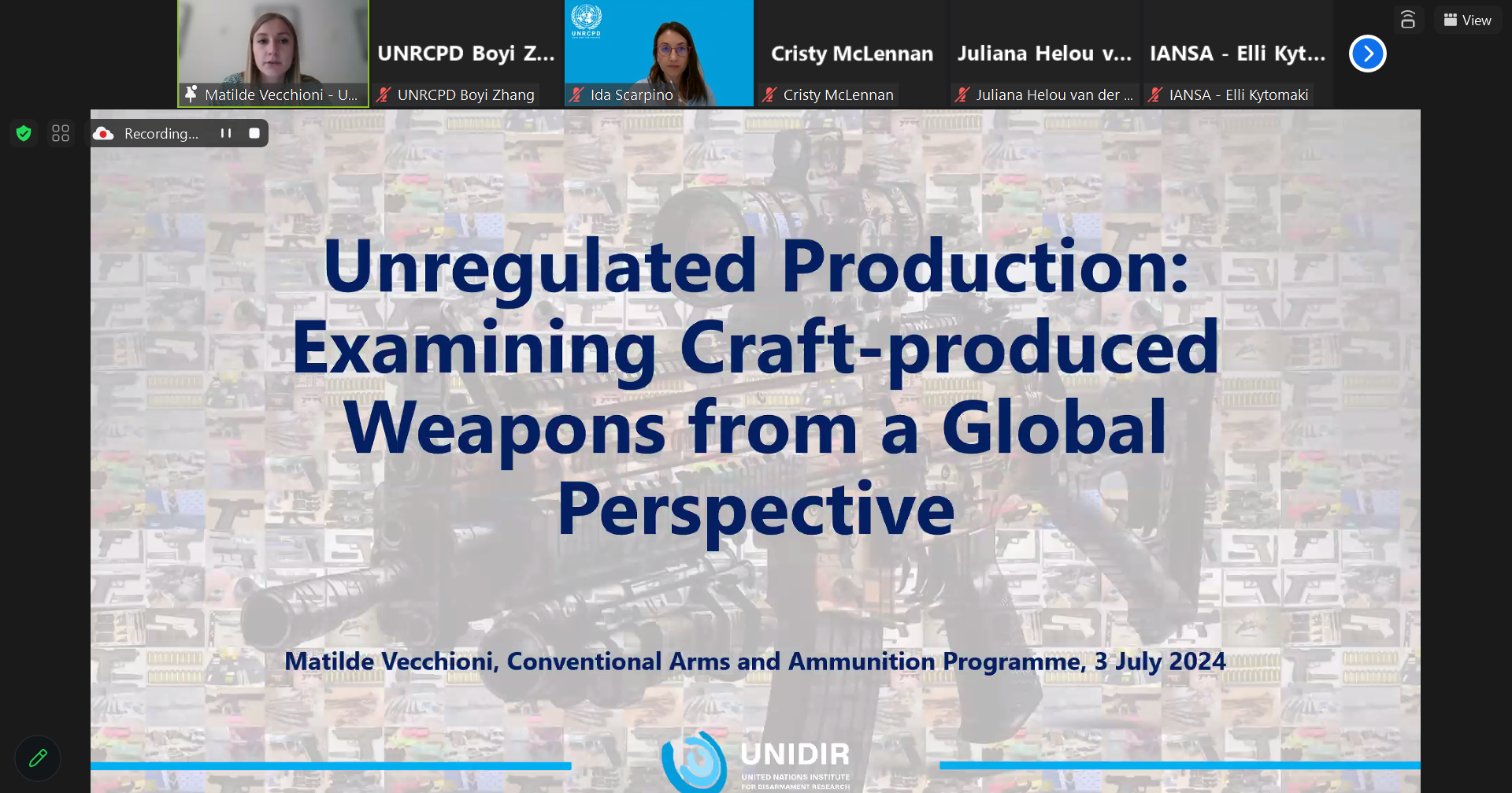
The Role of Civil Society in Small Arms Control
Instead of a regional spotlight, Day 4 had a special segment on the role of civil society in small arms control.Ms. Elli Kytomaki, Program Officer at the International Action Network on Small Arms (IANSA) closed the day by discussing IANSA’s efforts to promote peace and security. She specifically highlighted their work on gender-responsive approaches to disarmament, emphasizing the importance of addressing the disproportionate impact of armed violence on women, girls, and marginalized groups.
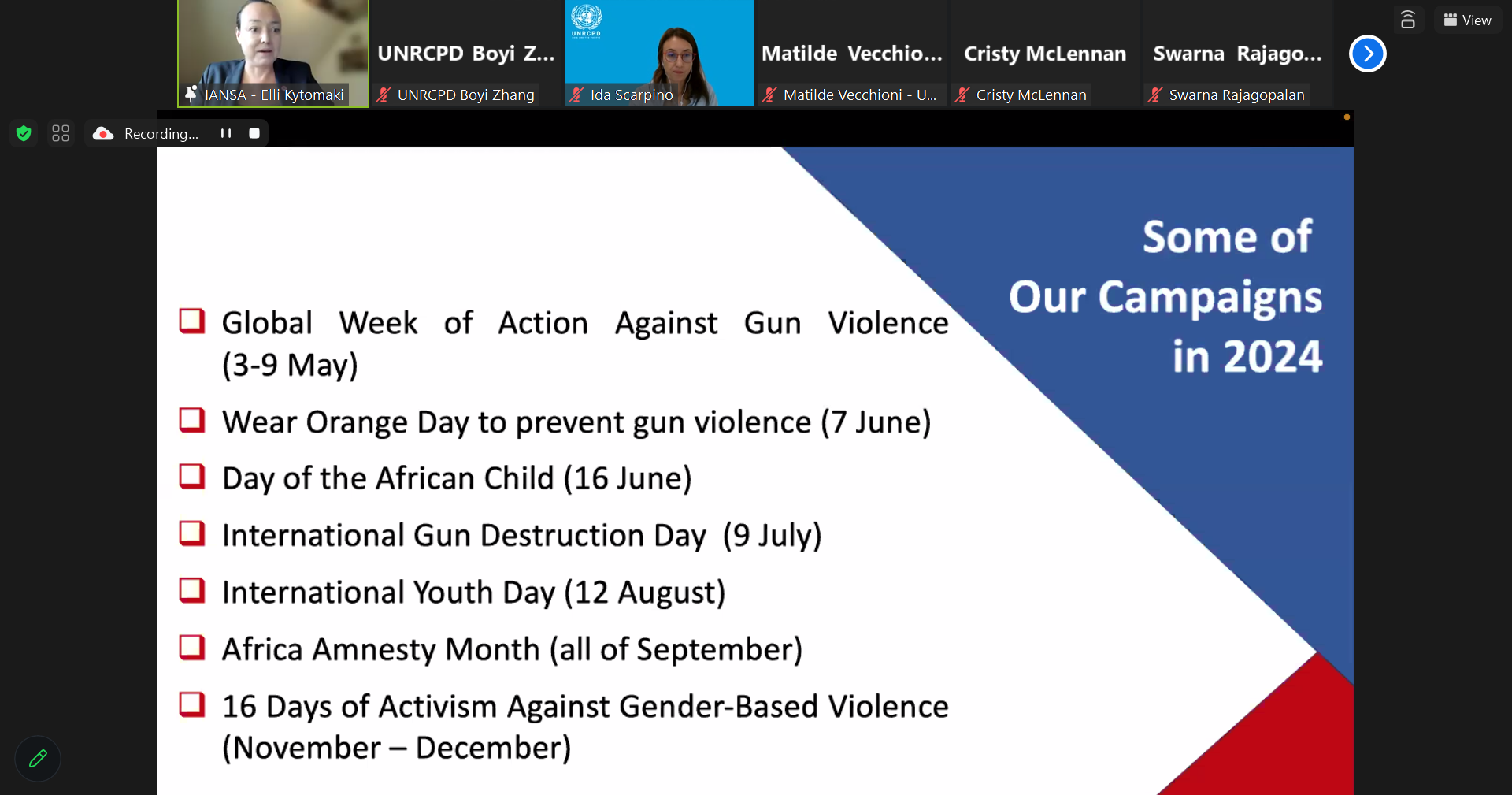
Day 5: State, Markets, War, and Patriarchy
Day 5 was moderated by Dr. Swarna Rajagopalan, who embarked on an interesting discussion on the linkages of disarmament with other topics. The first speaker of the day, Ms. Melissa Parke, Executive Director of the International Campaign to Abolish Nuclear Weapons (ICAN) and former Australian Minister for International Development, delivered an inspiring statement about the importance of full and meaningful participation of women in disarmament and arms control. She shared her career experiences related to disarmament, highlighting the plight of people endangered by nuclear weapons and testing.
The following segment was conducted as a panel-discussion with three distinguished speakers: Dr. Andrea Ellner, Lecturer in Defense Studies at the King’s College London (KCL), Dr. Sorcha MacLeod, Associate Professor at the University of Copenhagen, and Dr. Asha Hans, President of Sansristi and former Professor of Political Science and Founder Director School of Women’s Studies at Utkal University. Topics included the impact of armed conflict on various groups, gender-based violence, refugee crisis, human rights violations and war crimes were discussed.
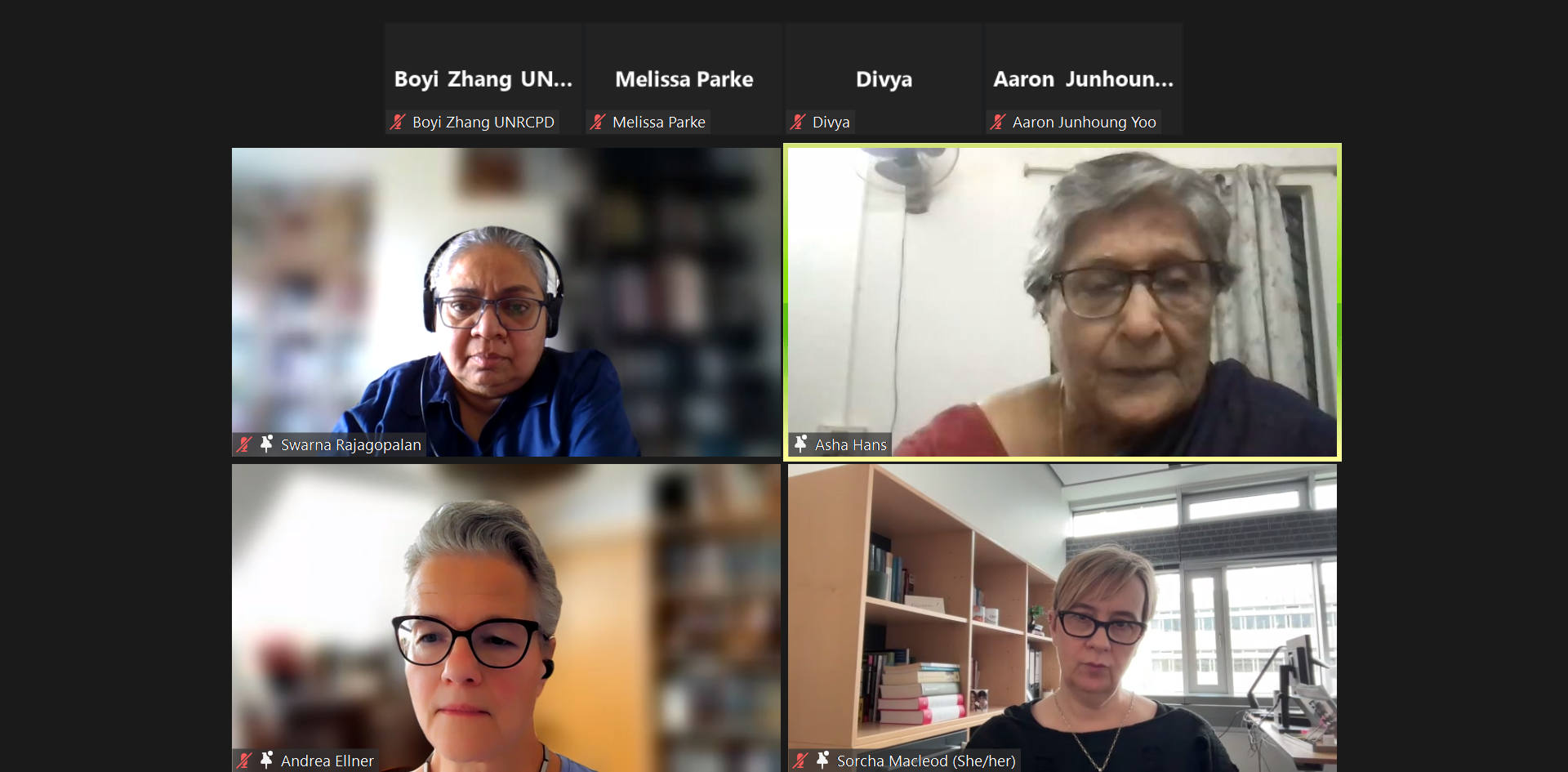
Regional Spotlight: Central America
Ms. Katja Boettcher, Deputy Director and Political Affairs Officer of the United Nations Regional Centre for Peace, Disarmament and Development in Latin America and the Caribbean (UNLIREC),introduced the challenges in Latin America and the Caribbean related to small arms, mine action, and gender-based violence. She also provided an overview of security issues and UNLIREC’s activities in the region.

Day 6: Engagement with Disarmament
Mr. Boyi Zhang, the anchor of day 6, started the session by encouraging participants to think about their own ways of achieving disarmament in the context of their experiences, emphasizing the importance of each person as an individual. Following the introduction, three youth speakers were invited to the discussion. Ms. Magritte Gordaneer, UN Youth Champions for Disarmament, highlighted various approaches for national implementation of youth disarmament efforts. Mr. Safayet Zamil Nowshan, another UN Youth Champion for Disarmament, addressed the humanitarian consequences of nuclear weapons. Mr. Wenji Sanchez, a Peace Educator from the UN Youth Leader Fund for a World without Nuclear Weapons, shared his experiences advocating for disarmament.
The next segment of the day was “Disarmament Education: Strategy, Resources, Opportunities”, delivered by Mr. Yosuke Nakagawa, Associate Political Affairs Officer at the UNODA Vienna Office, and Ms. Annelisa Miglietti, Outreach and Project Coordinator at the UNODA Vienna Office. They highlighted the interconnectedness of disarmament with various other global issues such as human rights, gender equality, and climate action. They also introduced resources and opportunities related to disarmament education for participants. These resources include the Disarmament Education Dashboard and other disarmament educational readings.
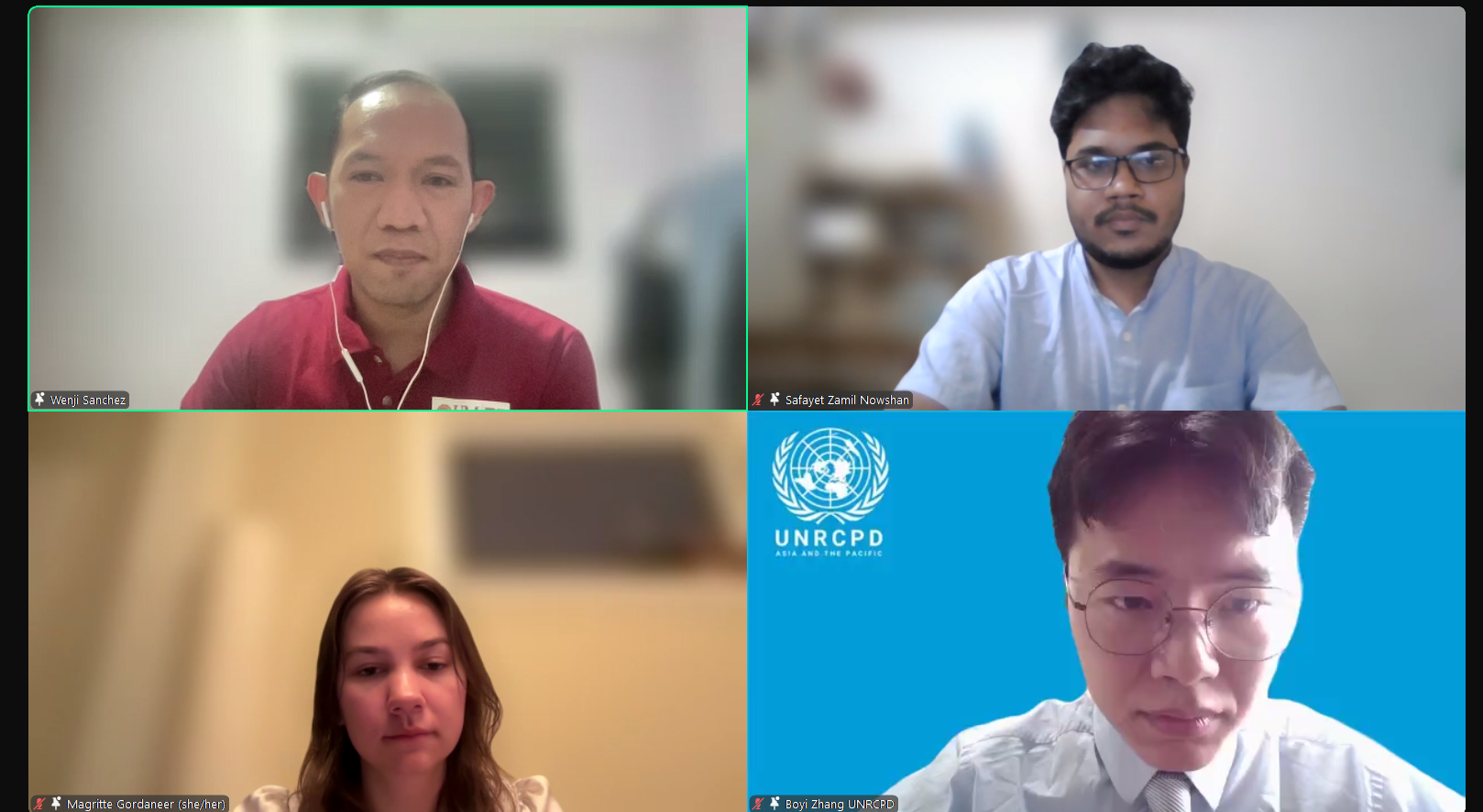
Regional Spotlight: Southeast Asia
For the Southeast Asia regional spotlight, H.E. Mr. I Gusti Agung Wesaka Puja, Executive Director of the ASEAN Institute for Peace and Reconciliation (ASEAN-IPR), to discuss ASEAN’s efforts to foster peace and stability in the region. Ambassador I Gusti Agung Wesaka Puja further explained ASEAN-IPR’s role in supporting conflict management and resolution within Southeast Asia and emphasized that conflict management has become a defining feature of contemporary governance in Southeast Asia, highlighting the significant rise in defense spending by Southeast Asian countries over the past two decades.
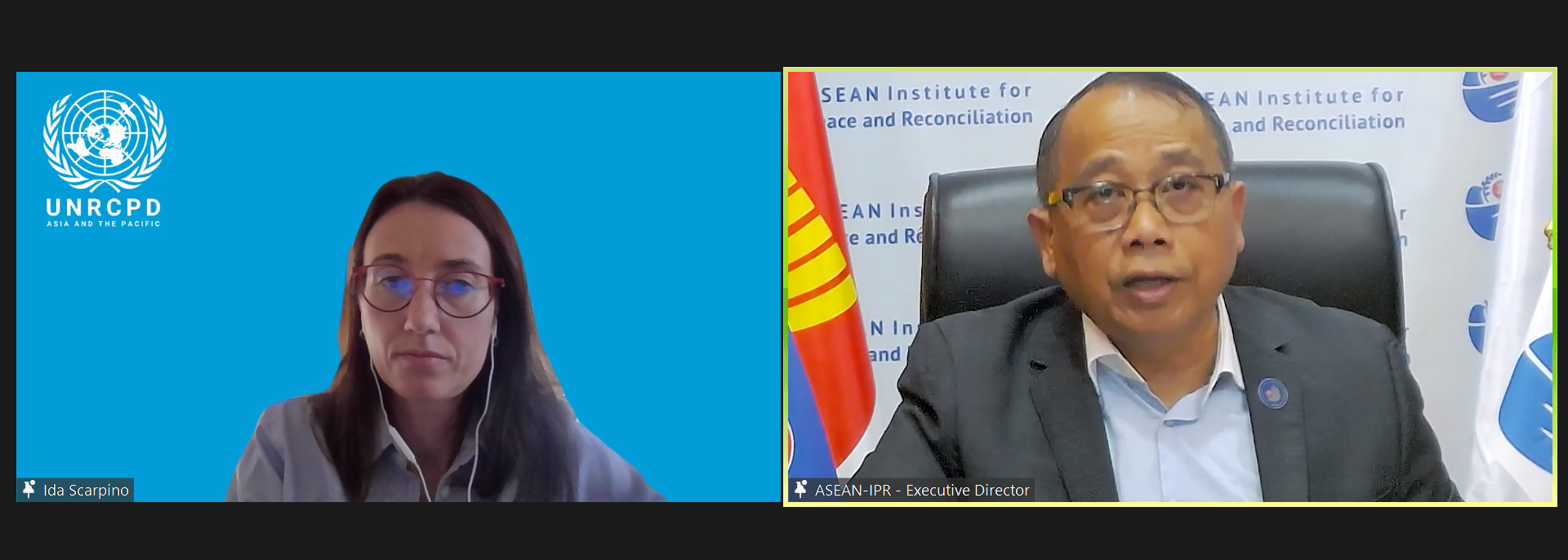
The Disarmament Toolkit 2024 concluded with closing remarks by Mr. Aaron Junhoung Yoo, Deputy Director of UNRCPD, and Dr. Swarna Rajagopalan, Managing Trustee of the Prajnya Trust, who reiterated the commitment of the respective organization to promoting disarmament education and fostering a culture of peace and the next generation of peace agents.

